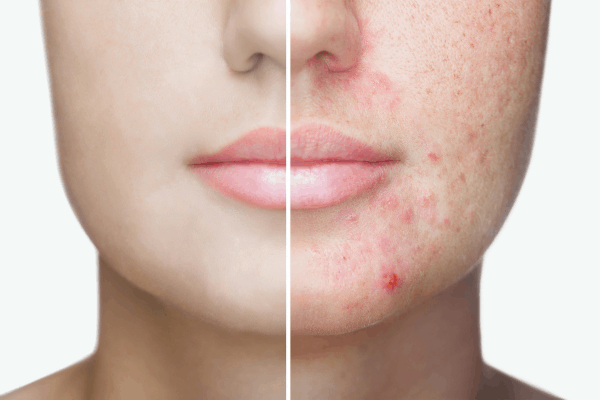In a world of keto-dieters, weight watchers, and yogis, not eating enough seems to be a good way to fit in.
But does not eating enough cause acne?
Yes, disordered eating can cause acne.
Eat less, your body no longer gets nutrients for beautiful skin. Eat more, your acne triggers are way off the charts!
Today, we’ll find the sweet spot between these two and discuss healthy eating habits for acne-prone skin.
Before we start, let us remind you that starving yourself is not healthy. What eventually cures acne breakouts is a proper diet, plenty of exercise, and a strong immune system.
I cover these topics in-depth such as diet protocols to solve acne and more within the Unmasking Acne resource kit.
What Poor Diet Does to Your Skin?
Got painful new breakouts every other week? Now would be a good time to fix your weakened immune system! Bad eating habits contribute to acne- it’s probably one of the first things your dermatologist said to you when you first walked in.
Did you know that it also decreases your natural collagen production? Ah, well, “Who needs collagen?” Turns out we all do! Collagen is a key structural protein that keeps our skin plump and youthful. As we age, our body produces less collagen every year. This is how we get smile lines and wrinkles around our cheeks.
So, not eating enough food can give you more skin problems. If you’re interested in a nutrition-heavy diet, you’ll love the following three diet plans for sure!
3 Easy Diet Plans to Reduce Acne for Good!
People can develop nutritional deficiencies when they’re dealing with an eating disorder related to acne, stress, or weight loss. To make sure that you’re eating enough, we’ve come up with three easy diets. Slowly but surely, they will bring your hormones into line and clear the breakouts. Have a look!
1. Eliminate Dairy and Processed Foods
Milk can aggravate your skin issues and hormonal imbalance. So, whether you like it or not, you need to satisfy your daily dose of nutrients from somewhere else. A lactose-free diet can reduce acne triggers and inflammation. You’re still free to have soy milk, broccoli, spinach, almond, and oats.
Additionally, processed foods are a big no in an anti-acne diet. Try to avoid sugary drinks, pastries, ham, sausage rolls, ready-to-eat meals, and frozen foods. One way or the other, they’re going to stimulate your oil glands and put you on the acne train.
2. Eat Plenty of Leafy Greens
Leafy greens are crucial for your health. In any case, switching to vegetable paella from pizza will be difficult. But if that’s what it takes to stop acne, eating veg every day a week shouldn’t hurt, right? A vegetarian diet is much safer for people with acne and underlying health issues.
Speaking of leafy greens, you should try kale, lettuce, arugula, celery, and spinach. They’re tasty, widely available, and have lots of nutrients for healthy, glowing skin. Not in the mood for salads? You can always go for collard rolls, tortellini soup, and sauteed greens!
3. High-Fiber Diets
Put your sugary cereals away, get oatmeal for breakfast and see what it does for your body acne. High-fiber foods keep blood sugar in check, which in turn reduces acne in men and women.
Apples, bananas, beans, brown rice, split peas, strawberries, and raisins are all high-fiber foods. However, if you’re tired of oatmeal, vegan quinoa cakes are exciting alternatives. And, hey, they’re crispy too!
One thing you should keep in mind is that you’re going to get fewer bowel movements on a high-fiber diet. To make sure you’re not constipated, drink lots of water during the day.
Hydration can definitely improve your skin condition. On the other hand, if you’re often dehydrated, your skin may appear dull. Use vitamin E as a topical treatment for acne scars, and eat fiber-rich foods on a daily basis.
Foods That Improve Cystic Acne in Adults and Teenagers
How amazing would it be to wake up with flawless skin? You could feel more confident and take gorgeous selfies for your social media account. But here you are, with small red bumps on your face wishing your acne would go away. What if we said you could clear your breakouts in three weeks?
It’s difficult but possible! You have to fight your midnight cravings for nuggets and start eating foods that are safe for acne!
Nuts
If you really want your acne to go away, you should take nuts on a daily basis. They’re rich in antioxidants, fiber, vitamin E, and L-arginine. Underweight teens who suffer from acne, eating disorders, and fiery hormonal changes find nuts quite appetizing.
We’re talking almonds, Brazil nuts, peanuts, and pistachios. Replace croutons with nuts and sprinkle almonds in your salads. Your skin will thank you for it!
Salmon
Yes, salmon. Thought you could pick up anti-acne foods from a vending machine? If only we were that lucky! Anyway, the good news is salmon helps you lose weight and minimize acne at home. It contains potassium, selenium, vitamin B12, astaxanthin, and Omega-3 fatty acids. These ingredients strengthen the skin barrier and can improve your immune system over time.
Oysters
You probably weren’t expecting oysters on our list of anti-acne foods. Even so, oysters are actually helpful for a healthy immune system. They’re high in zinc- a skin-friendly mineral that reduces acne and inflammation.
Zinc also kills acne-causing bacteria from the inside. If you’re an adult with health issues, your doctor would recommend keeping it to 40 milligrams a day.
Seaweed
Another super-food from the sea? Looks like we’re on a roll! Seaweed clears out acne and increases the suppleness of your skin. It’s a good source of iodide and got plenty of Omega-3 fatty acids.
Seawood is a good choice for people who have stopped consuming salted foods recently to keep their acne inflammation in control.
Getting Rid of Cystic Acne: Top 5 Foods to Avoid
Cystic acne isn’t pretty. On top of that, it hurts like hell. Want to make it stop? Avoid these five foods if you can. Be careful. The last one is going to break your heart!
1. Fast Food
Did you know that too much salt is bad for your acne? That’s right! No more salted potato chips and cheese dips! Salt and dairy are good sources of iodine, but both of these will cause health risks at some point.
The best course of action is to drop fast food altogether. It’s got processed meat, gluten, and all the things you naturally want to avoid for healthy-looking skin.
2. Dietary Supplements
Not eating enough calories is the only thing that stands between you and younger-looking skin. But dietary supplements might do more harm than good for your body and health.
Whey protein builds bigger muscles, but it’s also secretly giving you acne. It contains some amino acids that could produce more insulin in your body. So, if you want to keep acne on the down low, drop this food from your diet.
3. Dairy Products
When we say dairy products, we mean all of them. They might be the reasons you have clogged pores and acne, to begin with. More often than not, cow’s milk will cause a painful acne breakout.
Dairy products include ice cream, cheese, butter, sour cream, powdered milk, custard, and pudding. By the way, peanut butter is not a dairy product, and it’s safe for acne up to a certain amount.
4. Refined Carbohydrates
Carbs alone shouldn’t be a reason to develop disordered eating. Increase your physical activity levels, and your body will shed that extra weight in no time!
However, certain foods containing carbs are linked to acne flare-ups. It’s good to limit your bread, rice noodles, sodas, maple syrup, and white flour consumption, just in case!
5. Chocolate
According to a study, eating 25 grams of a 99% dark chocolate bar is likely to give you several acne spots in a span of two weeks. Yes, we know how unfair that sounds. We’re sorry.
The Best Way to Lose Weight When You Have Adult Acne
As long-term sufferers of adult acne, we can tell you that keeping your body weight in check definitely helps!
So, if you’re looking for a way to lose some weight and get rid of adult acne at the same time, you’re at the right place. We have the perfect diet, skincare, and workout combo to solve these issues once and for all! Make sure to keep reading!
Eat Foods That Increase Your Metabolism
People with high metabolism levels can choose to be less selective about their calorie intake. That’s a relief, isn’t it? Especially with Thanksgiving around the corner!
A fast metabolism will make sure that you burn more calories and get the best out of your workouts. These food ingredients have enough calories and nutrition to reset yours!
- Lean beef, fish, chicken, turkey
- Avocado, asparagus, spinach, and broccoli
- Celery, cucumber, carrot, tomato
- Apple, orange, lime, and berries
- Garlic, pepper, oats, and almond
Daily Workouts Can Regulate Hormonal Acne
The fight against hormonal acne may start in your teenage years and develop well into adulthood. Our number one suggestion would be to see a good dermatologist ASAP!
In the meantime, you can get some exercise and naturally balance these acne-causing hormones at home!
Studies have shown that getting regular exercise can decrease cortisol- the stress hormone behind hormonal acne. It also benefits people who are suffering from eczema and psoriasis. So, instead of eating less, get on your yoga mat and give us twenty squats!
Bottom Line
If you’re looking for a good starting place, check out our new book, Unmasking Acne – we go over the root causes of acne, along with dietary and supplement strategies that you can use to get permanently clear skin from within.
Acne breakouts are inevitable in certain age groups. So, the best you can do is minimize acne triggers and eat clean. It’s okay to be self-conscious about your diet, but make sure it doesn’t turn into an eating disorder. Hopefully, you know all about eating healthy at this point. Best of luck!
Frequently Asked Questions
People with acne have lower-than-average levels of vitamin D than those without acne. Vitamin D also obstructs P. acne, a harmful bacteria linked to the condition of acne, from negatively affecting the skin.
Acne can be caused by not eating enough. This is because your body is not getting enough nutrients on a day-to-day basis. Your skin barrier can be negatively affected by this and can develop acne, lose moisture, become textured, and even form wrinkles.


